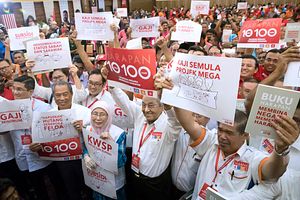Tun Mahathir Mohamad was sworn in as Malaysia’s prime minister on May 10 after an astonishing electoral victory that stunned many Malaysians and the world. The 92-year-old is now the world’s oldest leader.
Mahathir’s Pakatan Harapan (PH) coalition trounced incumbent Prime Minister Najib Razak’s Barisan Nasional (BN) coalition in general elections held on May 9. This is the first time since Malaysia’s independence in 1957 that an election has brought about a transfer of power and an end to BN rule in the Muslim-majority nation. It is also a big win for democracy.
A Win for Democracy
The peaceful political transition in Malaysia demonstrates the maturity of the country and perhaps a more positive tilt toward democracy than one might have expected after the 2013 election.
The developments in Malaysia are a ray of good news in a region that is witnessing creeping authoritarianism, as is evident in Cambodia, Thailand, and the Philippines, and democratic backsliding in Myanmar.
In Cambodia, Prime Minister Hun Sen, who is accused of cracking down on the opposition and media, will face elections in July.
In Thailand, the ruling military junta has been putting off elections.
In Myanmar, a humanitarian crisis is underway in Rakhine State where the military is prosecuting ethnic Rohingya even as the government backs away from democratic reforms.
In the Philippines, President Rodrigo Duterte’s constant attacks on the media have severely threatened press freedom.
The development in Malaysia represents an important swing of the pendulum back toward accountable democracy in the region.
This extraordinary win is even more remarkable as Mahathir used to lead BN and served as prime minister from 1981 to 2003. As prime minister, he ousted his then-deputy, Anwar Ibrahim, and served as Najib’s mentor. Following a change of heart earlier this year, Mahathir decided to lead the opposition coalition, PH, with Anwar (currently in jail) to run against Najib’s BN.
Most Malaysians never imagined that they would live to see this day. The last election, in 2013, was marred by allegations of widespread fraud, including the use of Bangladeshi migrants as illegal voters and other gerrymandering tactics. In that election, BN won enough parliamentary seats but lost the popular vote to the Anwar-led Pakatan Rakyat (PR).
PR dissolved in 2015 after Anwar was convicted and subsequently jailed on what were alleged to be trumped up charges of sodomy. Many Malaysians believed that he was being persecuted in an attempt to derail his political career and fracture the opposition. Now, Anwar, whom Mahathir has pledged to pardon, would become eligible to hold public office after his release.
Mahathir’s victory has, for the first time, put the opposition in charge of Malaysia. The prime minister and his government will need to chart a new course for Malaysia and live up to their electoral commitment of ensuring a thriving multiracial Malaysia.
This historic moment is likely to fuel public expectations for real change on issues such as press freedom, affirmative action race-based policies, corruption, and democratic governance.
PH set out 10 promises that it said it would accomplish within its first 100 days in office. Notable among these are promises to abolish the Goods and Services Tax (GST); investigate scandal-plagued institutions, specifically the government-owned 1Malaysia Development Berhad (1MDB); and re-introduce fuel subsidies. Malaysians will closely watch how Mahathir will work with the other parties within his loosely knit coalition and fulfill his electoral promises.
Many Malaysians harbor cautious optimism, and even some skepticism, about what the new government can actually do to reverse the years-long decay to which Mahathir himself contributed.
Malaysia’s Foreign Policy
What impact will Mahathir’s victory have on Malaysia’s relationships with China and the United States?
Under Najib, Malaysia is a significant beneficiary of Chinese investments and commitments, related to its Belt Road Initiative (BRI) under Najib. The BRI is Chinese President Xi Jinping’s signature foreign policy initiative. At a press conference on May 9, Mahathir expressed his support for the BRI but planned to consider renegotiating some of the deals Najib made. Mahathir needs to reflect on how some of these agreements align with his priorities for Malaysia’s growth and strategic interests, and most importantly consider the way forward for Malaysia’s relationship with China.
As for Malaysia’s relationship with the United States, that depends on U.S. President Donald J. Trump. U.S. trade tensions with China and Trump’s “America First” foreign policy are not viewed favorably in Malaysia. However, there has been quiet intelligence and military cooperation between the United States and Malaysia. One test for the relationship will be the degree to which the new Malaysian government cooperates with U.S. maritime efforts in the South China Sea. Mahathir applauded the investigation of the 1MDB and Anwar is known to promote moderate Islam and be pro-West, which bodes well for the future of U.S.-Malaysia relations.
Domestic Outlook
For Malaysian politics, the impact of Mahathir’s victory is far from certain. Will it push BN to combine forces with Malaysia’s conservative Islamic party (PAS) and increasingly pursue an Islamist agenda? Or will BN be forced to do some soul-searching and rethink how it could best serve Malaysia’s citizens?
Regardless, Malaysia now has the opportunity to serve as a shining new example of a Muslim-majority country that is moderate, multiracial, democratic, and open, if the new government makes the right moves.
HuiHui Ooi is an associate director in the Atlantic Council’s Scowcroft Center for Strategy Security.

































